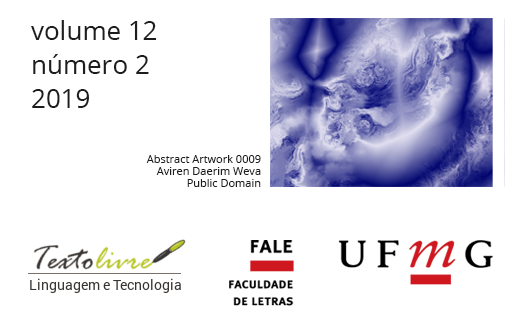Os quatro grandes desafios ao modelo de Ciência Aberta: (des)acreditação, informalidade, comodificação e predação
DOI:
https://doi.org/10.17851/1983-3652.12.2.202-213Palavras-chave:
ciência aberta, desafios, (des)acreditação, informalidade, comodificação, predação.Resumo
RESUMO:O modelo de Ciência Aberta, erguido da vontade de democratizar a produção e acesso ao conhecimento científico, surgiu no início do novo milênio como forma de combater o obsoletismo e fechamento da cultura acadêmica tradicional. Mais de uma década depois, cedendo não só às suas fraquezas idiossincráticas, como também à indústria parasitária e do lucro, o modelo de Ciência Aberta passou a enfrentar quatro grandes desafios que são simultaneamente um problema de (des)acreditação do conhecimento produzido, de informalidade das estruturas de avaliação e validação, de comodificação do conhecimento, e de predação do modelo de acesso aberto. Neste texto tentamos perceber aquilo que está na base desses desafios.
PALAVRAS-CHAVE: ciência aberta; desafios; (des)acreditação; informalidade; comodificação; predação.
ABSTRACT: The Open Science model arose in the beginning of the new millennium from the will to democratize the production and access to scientific knowledge, as a means to fight the obsolete/closed character of traditional academic culture. After more than a decade, conceding not only to its own idiosyncratic weaknesses, but also to a profit-seeking industry, the open science model now simultaneously faces four major challenges: the (dis)accreditation of the scientific knowledge produced, the informality of its validation structures, the commodification of knowledge, and the predation of the open access model. In this essay, we try to understand the basis of these challenges.
KEYWORDS: open science, challenges; (dis)accreditation, informality, commodification; predation.
Downloads
Referências
ADLER, R.; EWING, J.; TAYLOR, P.. Citation statistics: a report from the International Mathematical Union (IMU) in Cooperation with the International Council of Industrial and Applied Mathematics (ICIAM) and the Institute of Mathematical Statistics (IMS). Statistical Science, 24 (1), p. 1-14, 2009.
BARE, C. The guide to Open Science. 2014. Retrieved from: https://www.fosteropenscience.eu/. Access in: 22 Jul. 2019.
BARTHOLOMEW, R. E.. Science for sale: the rise of predatory journals. Journal of the Royal Society of Medicine 107 (10), p. 384–385, 2014. https://dx.doi.org/10.1177/0141076814548526.
BEALL, J.. Predatory publishers are corrupting open access. Nature 489, p. 179, 2012. https://dx.doi.org/10.1038/489179a.
BENKLER, Y.. The wealth of networks: How social production transforms markets and freedom. Yale: Yale University Press, 2006.
BOHANNON, J.. Hate journal impact factors? New study gives you one more reason. Science. 6 de julho de 2016. Retrieved from: http://www.sciencemag.org/news/2016/07/hate-journal-impact-factors-new-study-givesyou-one-more-reason. Access in: 22 Jul. 2019.
BUTLER, D. The dark side of publishing. Nature, 495, p. 433-435, 2013. https://dx.doi.org/10.1038/495433a.
CARDOSO, G.; CARAÇA, J.; ESPANHA, R.; TRIÃES, J.; MENDONÇA, S. As políticas de Open Access. Res publica científica ou auto-gestão? Sociologia, Problemas e Práticas 60, p. 53-67, 2009.
CARDOSO, G.; JACOBETTY, P. O que significa Open Science? Working report, 2010. Retrieved from: http://www.lini-research.org/np4/?newsId=12&fileName=open_science.pdf. Access in: 22 Jul. 2019.
CASATI, F. et al. Publish and perish: why the current publication and review model is killing research and wasting your money. ACIMED, 8(3), p. 298-309, 2006.
CASTELLS, M. The Power of Identity. Oxford, Blackwell Publishers, 2004.
CLARK, J.; SMITH, R. Firm action needed on predatory journals. The British Medical Journal 350(h210), 2015. https://dx.doi.org/10.1136/bmj.h210.
HOWARD, J. Humanities Journals Confront Identity Crisis. The Chronicle of Higher Education, 55(29), p. 8, 2009.
JOHNSTONE, M. J. Journal impact factors: implications for the nursing profession. International Nursing Review, 54 (1), p. 35-40, 2007. DOI: https://doi.org/10.1111/j.1466-7657.2007.00527.x.
KUPIEC-WEGLINSKI, J. W.. Journal Impact Factor (JIF): The good, the bad, and the ugly. Nowotwory. Journal of Oncology, 65(6), p. 481-482, 2015. DOI: http://dx.doi.org/10.5603/NJO.2015.0094.
MIROWSKI, P. The future(s) of open science. Social Studies of Science, 48(2), p. 171-203, 2018. https://doi.org/10.1177/0306312718772086.
NENTWICH, M. Cyberscience: Modelling ICT-induced changes of the scholarly communication system. Information, Communication & Society, 8(4), p. 542-560, 2005.
PAULUS, F. M.; CRUZ, N.; KRACH, S. The Impact Factor Fallacy. Frontiers in Psychology, 9(1487), p. 1-7, 2018.
PIPER, A. Is Open Science a neo liberal tool? Here´s why not. TXTLAB, McGill University, 2017. Retrieved from: https://txtlab.org/2017/02/is-open-science-a-neo-liberal-tool-hereswhy-not/. Access in: 22 Jul. 2019.
QUINTANILHA, T. L. Considerações sobre os desafios múltiplos da Ciência Aberta. Estudos em Comunicação, 21, p. 13-34, 2015. Disponível em: http://ec.ubi.pt/ec/21/pdf/ec21-02.pdf. Acesso em: 22 jul. 2019.
QUINTANILHA, T. L.; CARDOSO, G. The impact factor as a legitimator of the scientific knowledge produced: a review of the literature.
JANUS.NET e-journal of International Relations, 9(2), p. 32-44, 2018.
SEGLEN, P. O. Why the impact factor of journals should not be used for evaluating research. British Medical Journal, 314(7079), p. 498-502, 1997.
SKARLATIDOU, A.; HAMILTON, A.; VITOS, M.; HAKLAY, M. ‘What do volunteers want from citizen science technologies? A systematic literature review and best practice guidelines’. JCOM, 18(01), A02, 2019. https://doi.org/10.22323/2.18010202.
XIA, J., J. L.; HARMON, K. G.; CONNOLLY, R. M.; DONNELLY, M. R.; ANDERSON; HOWARD, H.A. Who publishes in predatory journals? Journal of the Association for Information Science and Technology, 66(7), p. 1406-1417, 2015. https://dx.doi.org/10.1002/asi.23265.
YEOH, M. P.; CAZAN, A. M.; ZAIB, S.; MUSS, W.; JACIC, L. Ethical and Predatory Publishing: Experiences and Perceptions of Researchers. Bulletin of the Transilvania University of Brasov, 10(1), p. 1-13, 2017.
Downloads
Publicado
Edição
Seção
Licença
Este é um artigo em acesso aberto que permite o uso irrestrito, a distribuição e reprodução em qualquer meio desde que o artigo original seja devidamente citado.











